What If? (37 page)
Authors: Randall Munroe
. . . it might be worth it.
- 1
Get a picture with the “polar bear crossing” sign.
- 2
Th
ese instructions also work for the other kind of Terminator.
- 3
xkcd, “Angular Momentum,”
http://xkcd.com/162/
.
Random Sneeze Call
Q.
If you call a random phone number and say “God bless you,” what are the chances that the person who answers just sneezed?
—Mimi
A.
It’s hard to find
good numbers on this, but it’s probably about 1 in 40,000.
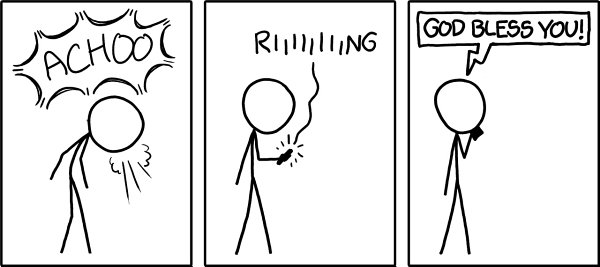
Before you pick up the phone, you should also keep in mind that there’s roughly a 1 in 1000,000,000 chance that the person you’re calling just murdered someone.
1
You may want to be more careful with your blessings.
However, given that sneezes are far more common than murders,
2
you’re still much more likely to get someone who sneezed than to catch a killer, so this strategy
is not recommended.
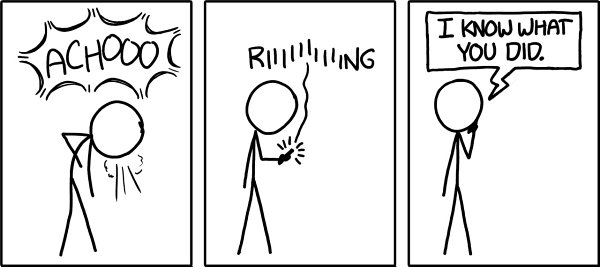
Mental note: I’m going to start saying this when people sneeze.
Compared with the murder rate, the sneezing rate doesn’t get much scholarly research.
Th
e most widely cited figure for average sneeze frequency comes from a doctor interviewed by ABC News, who pegged it at 200 sneezes per person per year.
One of the few scholarly sources of data on sneezing is a study that
monitored the sneezing of people undergoing an induced allergic reaction. To estimate the average sneezing rate, we can ignore all the real medical data they were trying to gather and just look at their control group.
Th
is group was given no allergens at all; they just sat alone in a room for a total of 176 20-minute sessions.
3
Th
e subjects in the control group sneezed four times during those
58 or so hours,
4
which
—
assuming they sneeze only while awake
—
translates to about 400 sneezes per person per year.
Google Scholar turns up 5980 articles from 2012 that mention “sneezing.” If half of these articles are from the US, and each one has an average of four authors, then if you dial the number, there’s about a 1 in 10,000,000 chance that you’ll get someone who
—
just that day
—
published
an article on sneezing.
On the other hand, about 60 people are killed by lightning in the US every year.
Th
at means there’s only a 1 in 10,000,000,000,000 chance that you’ll call someone in the 30 seconds after they’ve been struck and killed.
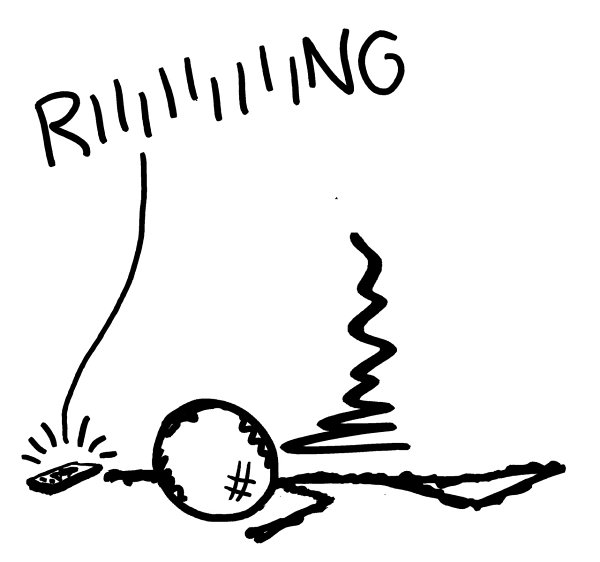
Lastly, let’s suppose that on the day this book was published, five people who read it decide to actually try this experiment. If they call numbers all day, there’s about a 1 in 30,000 chance that at some point during the day, one of them will get a busy signal because the person they’ve called is also calling a random stranger to say “God bless you.”
And there’s about a 1
in 10,000,000,000,000 chance that two of them will simultaneously call each other.
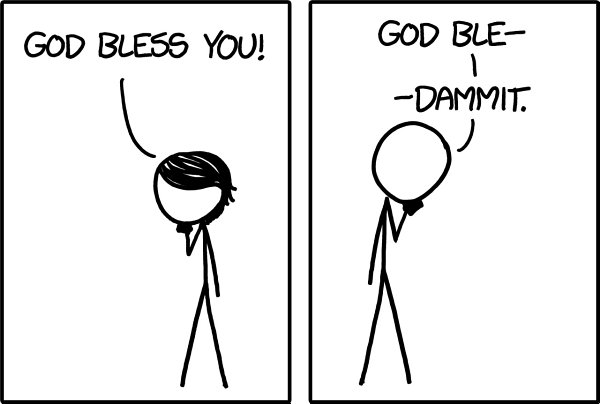
At this point, probability will give up, and they’ll both be struck by lightning.
- 1
Based on a rate of 4 per 100,000, which is the average in the US but on the high end for industrialized countries.
- 2
Citation: You are alive.
- 3
For context, that’s 490 repetitions of the song “Hey Jude.”
- 4
Over 58 hours of research, four sneezes were the most interesting data points. I might’ve taken the 490 “Hey Jude”s.
Weird (and Worrying) Questions from the What If? INBOX, #10

Q.
What is the probability that if I am stabbed by a knife in my torso that it won’t hit anything vital and I’ll live?
—Thomas
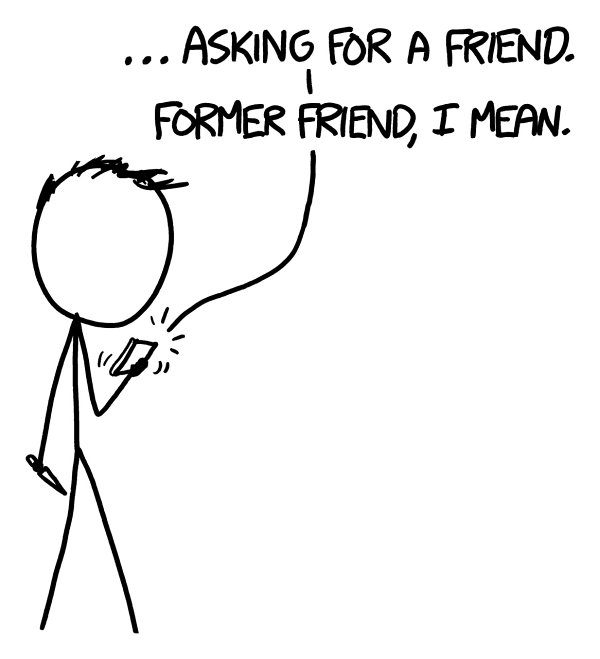
Q.
If I were on a motorbike and do a jump off a quarter pipe ramp, how fast would I need to be moving to safely deploy and land using the parachute?
—Anonymous
Q.
What if every day, every human had a 1 percent chance of being turned into a turkey, and every turkey had a 1 percent chance of being turned into a human?
—Kenneth
Expanding Earth
Q.
How long would it take for people to notice their weight gain if the mean radius of the world expanded by 1cm every second? (Assuming the average composition of rock were maintained.)
—Dennis O’Donnell
A.
Th
e Earth is not,
currently, expanding.
People have long suggested that it might be. Before the continential drift hypothesis was confirmed in the 1960s,
1
people had noticed that the continents fit together. Various ideas were put forward to explain this, including the idea that the ocean basins were rifts that opened in the surface of a previously smooth Earth as it expanded.
Th
is theory was never very widespread,
2
although it still periodically makes the rounds on YouTube.
To avoid the problem of rifts in the ground, let’s imagine all the
matter in the Earth, from the crust to the core, starts expanding uniformly. To avoid another drain-the-oceans scenario, we’ll assume the ocean expands, too.
3
All human structures will stay.
t = 1 second
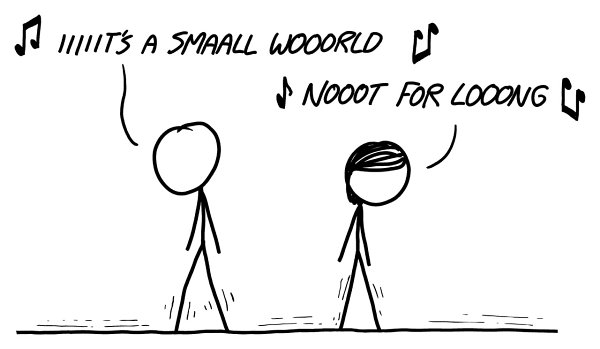
As the Earth started expanding, you’d feel a slight jolt, and might even lose your balance for a moment.
Th
is would be very brief. Since you’re moving steadily upward at 1 cm/s, you woudn’t feel any kind of ongoing acceleration. For the rest of the day, you wouldn’t notice much of anything.
t = 1 day
After the first day, the Earth would have expanded by 864 meters.
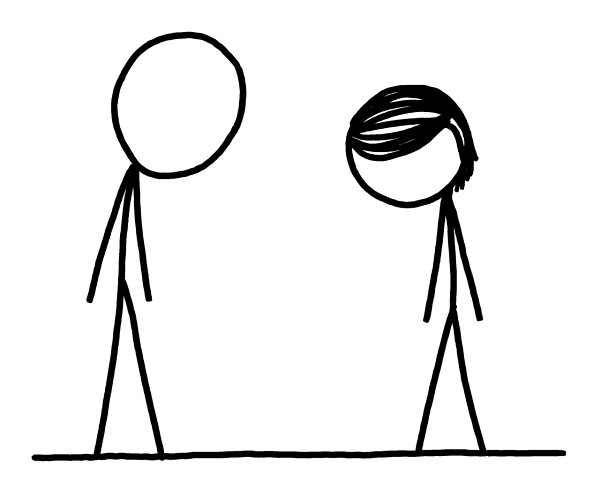
Gravity would take a long time to increase noticeably. If you weighed 70 kil-ograms when the expansion started, you’d weigh 70.01 at the end of the first day.
What about our roads and bridges? Eventually, they would have to break up, right?
Not as quickly as you might think. Here’s a puzzle I once heard:
Imagine you tied a rope tightly around the Earth, so it was hugging
the surface all the way around.
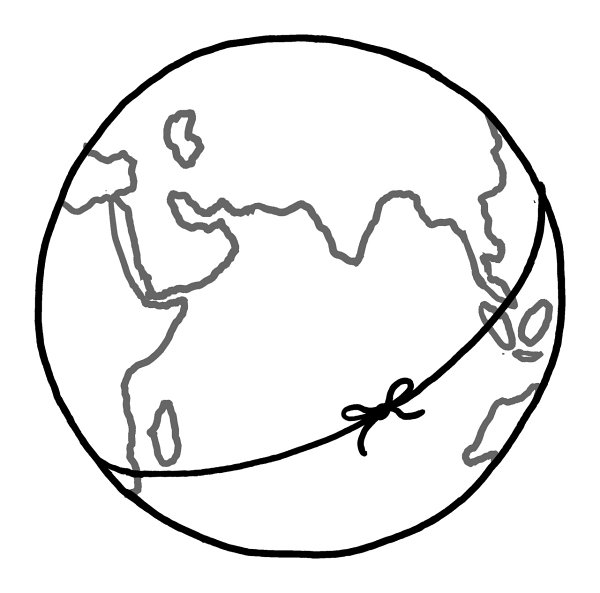
Now imagine you wanted to raise the rope 1 meter off the ground.

How much extra length will you need to add to the rope?
Th
ough it may seem like you’d need miles of rope, the answer is 6.28 meters. Circumference is proportional to radius, so if you increase radius by 1 unit, you increase circumference by 2π units.
Stretching a 40,000-kilometer line an extra 6.28 meters is pretty negligible. Even after a day, the extra 5.4 kilometers
would be handled easily by virtually all structures. Concrete expands and contracts by more than that every day.
After the initial jolt, one of the first effects you’d notice would be that your GPS would stop working.
Th
e satellites would stay in roughly the same orbits, but the delicate timing that the GPS system is based on would be completely ruined within hours. GPS timing is incredibly
precise; of all the problems in engineering, it’s one of the only ones in which engineers have been forced to include both special
and
general relativity in their calculations.
Most other clocks would keep working fine. However, if you have a very precise pendulum clock, you might notice something odd
—
by the end of the day, it would be three seconds ahead of where it should be.
t = 1 month
After a month, the Earth would have expanded by 26 kilometers
—
an increase of 0.4 percent
—
and its mass would have increased by 1.2 percent. Surface gravity would have gone up by only 0.4 percent, rather than 1.2 percent, since surface gravity is proportional to radius.
4
You might notice the difference in weight on a scale, but it’s not a big deal. Gravity varies by this much between different
cities already.
Th
is is a good thing to keep in mind if you buy a digital scale. If your scale has a precision of more than two decimal places, you need to calibrate it with a test weight
—
the force of gravity at the scale factory isn’t necessarily the same as the force of gravity at your house.
While you might not notice the increased gravity just yet, you’d notice the expansion. After a month,
you’d see a lot of cracks opening up in long concrete structures and the failure of elevated roads and old bridges. Most buildings would probably be OK, although those anchored firmly into bedrock might start to behave unpredictably.
5
At this point, astronauts on the ISS would start getting worried. Not only would the ground (and atmosphere) be rising toward them, but the increased gravity
would also cause their orbit to slowly shrink.
Th
ey’d need to evacuate quickly; they’d have at most a few months before the station reentered the atmosphere and deorbited.
t = 1 year
After a year, gravity would be 5 percent stronger. You’d probably notice the weight gain, and you’d definitely notice the failure of roads, bridges, power lines, satellites, and undersea cables. Your pendulum
clock would now be ahead by five days.
What about the atmosphere?
If the atmosphere isn’t growing like the land and water are, air pressure would start dropping.
Th
is is due to a combination of factors. As gravity increases, then air gets heavier. But since that air is spread out over a larger area, the overall effect would be
decreasing
air pressure.
On the other hand, if the atmosphere
is also expanding, surface air pressure would rise. After years had passed, the top of Mount Everest would no longer be in the “death zone.” On the other hand, since you’d be heavier
—
and the mountain would be taller
—
climbing would be more work.
t = 5 years
After five years, gravity would be 25 percent stronger. If you weighed 70 kg when the expansion started, you’d weigh 88 kg now.
Most of our infrastructure would have collapsed.
Th
e cause of the collapse would be the expanding ground below them, not the increased gravity. Surprisingly, most skyscrapers would hold up fine under much higher gravity.
6
For most of them, the limiting factor isn’t weight, but wind.
t = 10 years
After 10 years, gravity would be 50 percent stronger. In the scenario where the atmosphere isn’t
expanding, the air would become thin enough to be difficult to breathe even at sea level. In the other scenario, we’d be OK for a little while longer.
t = 40 years
After 40 years, Earth’s surface gravity would have tripled.
7
At this point, even the strongest humans would be able to walk only with great difficulty. Breathing would be difficult. Trees would collapse. Crops wouldn’t stand
up under their own weight. Virtually every mountainside would see massive landslides as material sought out a shallower angle of repose.
Geologic activity would also accelerate. Most of the Earth’s heat is provided by radioactive decay of minerals in the crust and mantle,
8
and more Earth means more heat. Since the volume expands faster than the surface area, the overall heat flowing out per
square meter will increase.
It’s not actually enough to substantially warm the planet
—
Earth’s surface temperature is dominated by the atmosphere and the Sun
—
but it would lead to more volcanoes, more earthquakes, and faster tectonic movement.
Th
is would be similar to the situation on Earth billions of years ago, when we had more radioactive material and a hotter mantle.
More active plate
tectonics might be
good
for life. Plate tectonics play a key role in stabilizing the Earth’s climate, and planets smaller than Earth (like Mars) don’t have enough internal heat to sustain long-term geologic activity. A larger planet would allow for more geologic activity, which is why some scientists think that exoplanets slightly larger than Earth (“super-Earths”) could be
more
friendly to life
than Earth-sized ones.
t = 100 years
After 100 years, we’d be experiencing over 6 gees of gravity. Not only would we be unable to move around to find food, but our hearts would be unable to pump blood to our brains. Only small insects (and sea animals) would be physically able to move around. Perhaps humans could survive in specially built controlled-pressure domes, moving around by keeping
most of our bodies submerged in water.
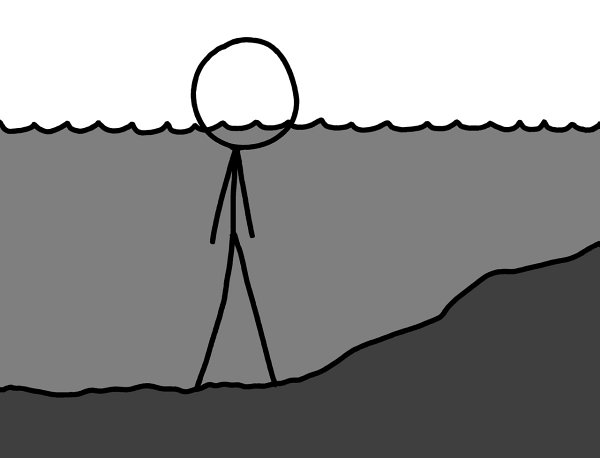
Breathing in this situation would be difficult. It’s hard to suck in air against the weight of the water, which is why snorkels can only work when your lungs are near the surface.
Outside of low-pressure domes, the air would become unbreathable for a different reason. At somewhere around 6 atmospheres, even ordinary air becomes toxic. Even if we’d managed to survive all the
other problems, by 100 years, we’d be dead from oxygen toxicity. Toxicity aside, breathing dense air is difficult simply because it’s
heavy
.
Black hole?
When would the Earth eventually become a black hole?
It’s hard to answer that, because the premise of the question is that the radius is steadily expanding while the density stays the same
—
whereas in a black hole, the density increases.